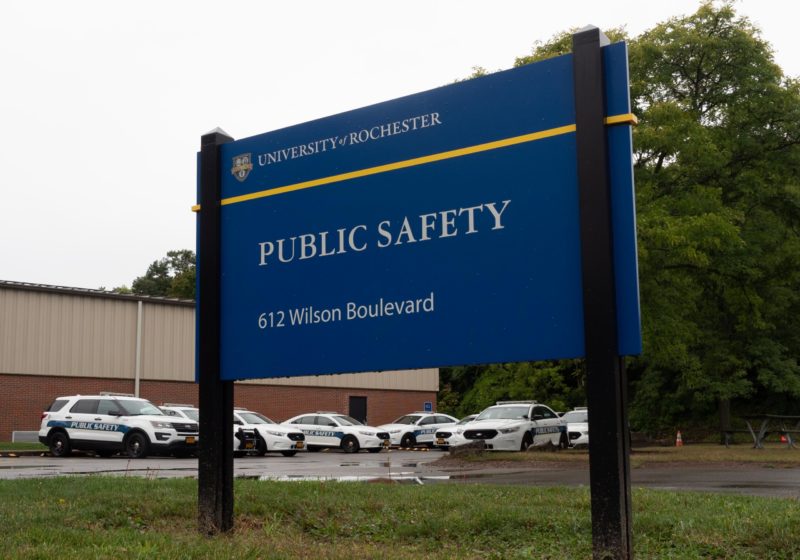A committee of UR and Rochester community members hopes to transform UR’s Public Safety Review Board (PSRB) by broadening and diversifying its membership and powers.
One of those expanded powers would be approval over the Department of Public Safety’s budget. The reformed PSRB would also have around 40 members, while the current PSRB has nine.
“We want every single person who is a vulnerable member of the community,” senior Amanda Liang said, “or even a member of the community who has a greater stake in [Public Safety issues] than a Board of Trustees member who doesn’t live on campus, for example, […] to have their voices heard.”
Student members of the Ad Hoc Committee to Reimagine the PSRB — formed in June by Faculty Senate — presented a report from the committee pushing these goals and seeking feedback from students at a Thursday town hall.
At the beginning of the meeting, Committee member and junior Steven Colberg gave an overview presentation with Liang, and then — with sophomore Devon Rogers — spent the rest of the meeting answering questions and getting feedback. Since they are still in the feedback stage, the proposal is still subject to change.
According to a version of the report provided to the Campus Times on Saturday, the Committee is proposing that the reformed board have around 37 voting members, including four from administration, nine faculty, seven undergraduates (with stipulations made to ensure diversity), five graduate students, four service workers, three community members, and one alumnus. Those voting members would elect two co-chairs to lead the PSRB annually.
A Board of Trustees member, the Senior Vice President for Administration and Finance (currently Holly Crawford), the Director of Public Safety (currently Mark Fischer), and a representative of Public Safety Officers would compose the four non-voting members of the PSRB.
The current PSRB is chaired by a trustee, and is composed of six permanent members from administration, plus three students and two faculty appointed annually. Information about the current board and meeting minutes can be found on the PSRB’s webpage.
The PSRB’s mission is also stated on that webpage: “The Review Board will periodically review our selection, training, cultural sensitivity, de-escalation procedures, terms of engagement, and gun safety measures.” It then says that the Board reviews any weapon-usage by a Public Safety officer as well as any racial bias complaints regarding Public Safety, “consistent within existing University policies and procedures.”
Early in Thursday’s meeting — which was hosted by the Minority Student Advisory Board and the SA Governments of Eastman School and the College of Arts, Sciences, and Engineering — Colberg read a key aim of the Committee’s proposal aloud from the presentation: “The new [PSRB] needs to be part of a wider institutional effort that embraces antiracism, community partnerships, restorative justice, conflict mediation, and non-extractive economic development in the City of Rochester.”
The feedback portion of the meeting included questions about how PSRB members would be selected and why spots would be reserved specifically for members of SA government. In many cases, the answers were ambiguous, or still undecided. The presenters made clear that the ambiguities are why public feedback is crucial to their process.
The PSRB was founded in 2016 by then-president Joel Seligman, when he also adopted a controversial recommendation to arm Public Safety officers at the UR Medical Center, as well as some of Public Safety’s command staff. For many, the PSRB was cast back into the spotlight in 2018, when Public Safety proposed giving armed supervisors access to all campuses, and adding an armed officer post on River Campus, Brooks Landing, and at Eastman. Many students called for the proposal to be rejected on the grounds that it endangered students.
In agreement with a recommendation by a 27-person committee of UR community members, Feldman allowed armed supervisor access to all campuses, but did not create new armed posts. The PSRB had recommended that the gun proposal be wholly accepted.
When a student asked how abolitionist voices would be heard on the proposed new Review Board, Liang responded that the new Review Board would give the necessary power to those voices.
“This would allow a democratic element to be introduced into a system that has no democratic element at all, where decisions are just sort of made by people who are […] not representing all of the community,” she said. “So this gives voting power directly to […] students that are directly dealing with these problems.”
When asked how the new PSRB would avoid legitimizing Public Safety rather than providing steps to abolish it, Liang said that often, demands of students — like abolition — go forgotten once those students graduate, leaving the incoming students uninformed. Keeping the PSRB in the public eye could be the answer to that, Liang said.
“Ideally, in order to keep the pressure on to continue making progress in terms of abolition and continue defunding or disarming, what we need to have is this board be very visible.”





